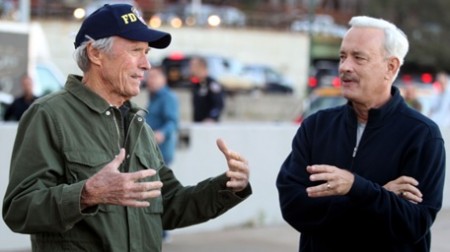In Clint Eastwood’s 35th time directing a movie, Sully confidently and emotionally recreates the 2009 Hudson River “miracle”, where as captain, he managed to land a commercial airline on the river itself. The film also provides actor Tom Hanks with a platform for his best performance of the last decade. Surely to be forgotten by the time Oscar season reaches its zenith– as this film was released too early in September– this harrowing true story gives viewers fact over fiction.
Eastwood, over the course of his last few films, has impressively developed a style of narrative storytelling that allows for facts to dictate emotional arches rather than folklore. American Sniper, arguably, is a prime example of this – a film made with no agenda other than awareness of PTSD and its effects on returning soldiers. The thing that makes Sully concise and poignant is its terse recreation of events and the fallout that very few knew regarding Capt. Chesley Sullenberger. The film’s climactic events intersperse with Sully’s trial investigation held by the National Board of Safety Transportation. With his moral actions examined, he, along with his co-pilot Jeff Skiles, played by a mustache-confident Aaron Eckhart, jog late into the New York City night most evenings questioning why they are being held responsible for an act of pure coincidence, and also of genuine real time heroism. The trial takes place over the course of almost a year to decide the fate and careers of both men, to determine whether their decision to land US Airways Flight 1549 on the Hudson, after a flock of Canadian geese crippled both engines, was just. This type of structure allows the film to involve the audience throughout, to live through Sully’s moral duty that saved the lives of all 155 souls on board that fateful day. The script, written by Todd Komarnicki, excels in exploring this moral restlessness against the contemporary media’s binary praise vs. its cynicism. Such dualities are at the heart of Sully’s character and make the film a riveting bio-pic.
It would be hard to imagine, much like Sully being absent in the pilot seat on his destined flight, that anyone without the proper panache could pull off this portrait of this man other than Tom Hanks. This is a role that reminds the public that Hanks is more than just a pithy guest on morning shows; he is a studied actor who makes choices in scenes that ground the reality of the story. His look is mature, with snow white features; his voice is tonally low, and his poised glares add weight to his spoken dialogue, giving his performance seemingly effortless ease. These combinations allow the audience to sympathize with his character’s humanity. He is as much understated as he is specific. Is his performance worthy of an Oscar? Of course, but the problem with releasing an Oscar quality performance in September is that by January it is often no longer in vogue for Academy voters. The point is almost moot though, as Sully was not made for awards; it was made for its heroism.
New York City is beautifully photographed to give the story a backdrop of glitz, while yet underscoring a grim reality. The flawless CGI effects and panoramic shots maximize the height and steel of the buildings that were thankfully averted in favor of the chilly waters of the Hudson. The film was also partially shot with IMAX cameras and lenses – unusual for a drama – but utilized appropriately here to add another dimension of scope from the inside of the plane to its landing. The supporting cast of Laura Linney, Mike O’Malley and Anna Gunn all add credible substance to otherwise one-note roles.
With a runtime of an hour and thirty-five minutes, unusually quick for a bio-pic of this notoriety, the expedited editing works to its benefit. Eastwood is a no-nonsense director famous for one to two takes, always out for the meat of the story. In this case it’s classic valor. Capt. Chesley Sullenberger saved 155 lives that fateful day and perhaps the only splash of commentary Eastwood sneaks in towards the end is that this type of heroism is a rarity in today’s world and too often not praised suitably or accurately.
4/4
Steven Havira




